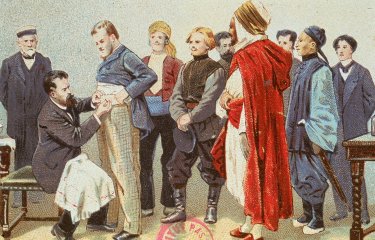A few years ago, measles seemed to be on the verge of being eradicated in many countries. The recent rise in cases raises several questions. Why is measles making a comeback? Is the measles, mumps and rubella (MMR) vaccine safe? Does measles only affect children?
#1 - What is behind the current resurgence in measles?
Insufficient vaccine coverage.
At the end of April 2025, WHO, UNICEF and Gavi, the Vaccine Alliance, raised the alarm at the worrying rise in vaccine-preventable disease outbreaks, including measles.
Not long ago, measles was on the verge of being eradicated in several countries, yet the number of infections has considerably increased in recent months:
- in France, between January 1 and August 31, 2025, 858 cases were reported, compared with 483 cases for the entire year 2024
- in England, 742 cases were reported between January 1 and August 28, 2025. In 2024, there were 2,911 confirmed cases, the highest number since 2012
- in Europe and Central Asia, 127,300 cases were reported in 2024, more than twice the 2023 figure
- in the United States, 1,454 cases were reported between January 1 and September 9, 2025, compared with 344 cases for the entire period 2023-2024
These different countries and regions have one thing in common: they all have insufficient vaccine coverage.
There are several reasons for this. The COVID period made routine medical visits more difficult, undoubtedly contributing to a drop in vaccination appointments.
The recent pandemic also had a significant impact on perceptions of vaccination. Although for some people it strengthened their trust in vaccination, for others it raised questions and doubts. Several measles outbreaks have occurred in vaccine-skeptical communities.
Since measles is a highly contagious disease, it can only be eradicated with high vaccine coverage – around 95% of the population needs to be vaccinated.
#2- Is the measles, mumps and rubella (MMR) vaccine effective?
Yes, vaccination against measles is safe and effective.
In France, vaccination is compulsory and involves two doses, the first at 12 months and the second between 16 and 18 months.
These two doses provide nearly 100% protection against measles. And that protection lasts, as shown in a recent study by Santé publique France and the Institut Pasteur: it declines by just 0.22% a year after childhood vaccination.
Vaccination against measles continues to be the safest and most effective way of preventing infection. It plays a crucial role in establishing collective immunity, which in turn reduces the risk of outbreaks and provides vital protection for vulnerable individuals.
According to Gavi, measles vaccination is thought to have saved 94 million lives worldwide since 1974.
Ongoing misinformation about a supposed link between vaccination and autism spectrum disorder (ASD) also continues to circulate.
This false claim dates back to a scientific paper published in 1998, with Andrew Wakefield as its lead author. The paper was retracted in 2010 when an inquiry clearly demonstrated that several elements of the study were incorrect and that its conclusions were flawed and misleading.
The alleged link between the MMR vaccine and ASD has never been proven, despite several large-scale studies involving hundreds of thousands of people.
In short, as explained by Thomas Bourgeron, a scientist at the Institut Pasteur working on the genetic causes of ASD, in his book Des gènes, des synapses, des autismes, "vaccination against MMR does not increase the risk of autism and does not trigger autism in children with risk factors."
#3- Does measles only affect children?
No, adults can also contract measles.
Although measles mostly affects young children, it is not strictly a childhood disease. Adults can also catch it.
Among the cases reported in 2025, the median age of individuals was approximately 17 in France, and 34% of virus carriers were aged over 20 in the United States.
As well as the characteristic symptom of small red blotches on the skin, measles can also lead to serious complications. These occur more often in infants under the age of 1 and adults over the age of 20. In infants, measles can cause severe respiratory complications. In adults, some patients develop neurological conditions, which can prove fatal in the most serious cases.





